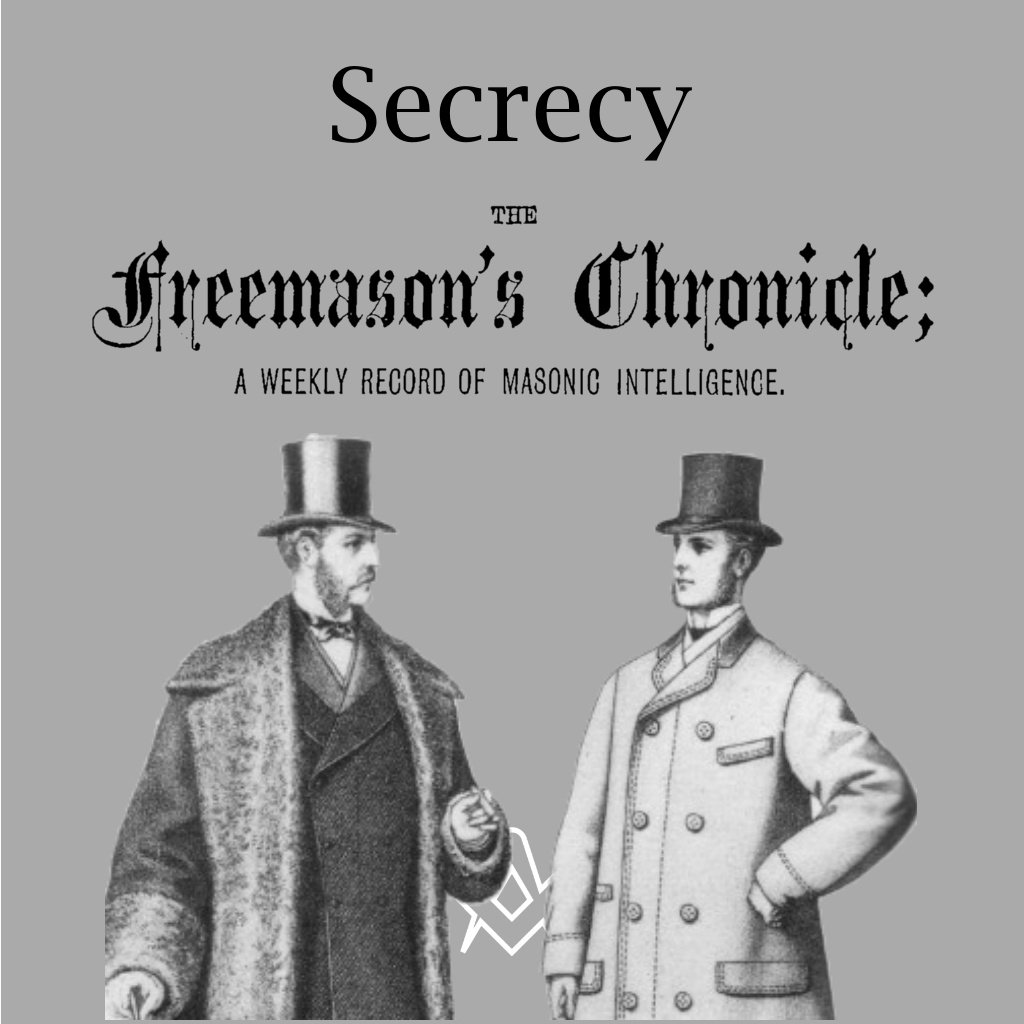Secrecy perhaps the strongest objection urged by the enemies of the Masonic Order against its existence, arises from the fact that it is essentially a secret institution.
Secrecy is, indeed, a most important keystone of the great edifice; but surely no rational mind can over be brought to hold that secrecy is in itself criminal.
The broad Catholic principles which bind and govern the brotherhood are all well-known, all public property, and any man may know them if he will but read.
True, the working of the Craft is the great enigma of which the world is ignorant, as indeed it ought to be, for no man has a right to a prying interference in the affairs of his fellow men.
It may seem ridiculous to a thinking mind, to dispute seriously a proposition in itself absurd, but unhappily there are people who often yield to the influence of a subtle train of reasoning without a moment’s consideration of the false and deceptive basis whereon it rests.
![]()
… is secrecy a crime ?
To begin then, at the beginning—is secrecy a crime ?
Is not the mind of every man a secret volume, concealed from the eye of his fellow man ?
Where is the human breast that is not, to some extent, the repository of secrets ?
Has not the tongue of man been condemned a thousand times for its imprudent and unnecessary utterances, where it has once for its silence ?
How often have we not heard men commended for their wisdom and discretion, when the secret of that wisdom and discretion was simply a closed mouth and a silent tongue ?
Why, in the name of reason, should the secrets of an orderly and benevolent community dishonour it, when every well-regulated family maintains its secrets and its honour unimpaired ?
Every government under the sun, no matter what its nature, has its secrets—secrets which it is bound to keep from the people, at least for a time, or it would fail in its purposes, perhaps in its very being.
Surely, then, secrecy in itself can be no crime, for as long as a secret is honourably kept peace reigns, virtue is protected, truth lives, character is preserved, and the whole public welfare is safely guarded.
![]()
… your secrets are foolish, injurious, subversive of order
“But,” our enemies will say, “your secrets are foolish, injurious, subversive of order, mutual confidence and good government; ” and by a process of argument, as false and illusive as the proposition whereon it is founded, they go on heaping up vilification and slander against an institution, the very nature of which precludes the possibility of investigation.
Groping on, in their ignorance and darkness failing to comprehend and control, they labour to subvert and destroy.
As well might they strive with tongue and pen to uproot the timeworn landmarks of that ancient Eastern clan the cradle of the human race, the birthplace of masonry, and the theatre of on immortal tragedy.
How man in spirit and contemptible in nature must that man be, who traduces, who slanders a man or woman he does not know, or who pours the vials of his vindictive wrath upon a house or an institution that he has never been in.
![]()
… Oh! it’s a secret society and can-not be good
And yet, they will tell you, ” Oh! it’s a secret society and can-not be good.”
Not good, forsooth, because it has secrets. Not good, because it keeps its affairs to itself, and never preys into those of its neighbours ?
It is secret, and secrecy is a crime. Then is government criminal, society criminal, people criminal, the world a crime, yea, even the boundless universe itself one vast crime, since its limit-less depths hold an infinity of secrets, that the mind of man can no more penetrate nor comprehend than it can control.
But, to return to more familiar things, does not every man of sense know that all artists, mechanics and tradesmen have their secrets of trade and business, which they keep to themselves?
What artist or photographer will initiate you into the mysteries of his studio?
What merchant or man of business will publish his ledger and correspondence, and what writer will tell you the sources of inspiration on which he draws ?
Every trade, every business and every profession has its secrets, and is not this their unquestioned right ?
Who will forfeit his reputation for common sense by asserting that there is aught wrong in maintaining such secrets ?
How often daily do we see the legend ” No admittance here except on business,” and what but that is written on the portals of the Masonic temple ?
If such policy were made universal would not the whole world have greater quiet and happiness ?
How often in life does the soft tongue of hypocrisy tell the secrets which, though true, lead to envy, hatred, misery, broils and death ?
Indeed it is the publication of the secrets of human littlenesses and human weaknesses that destroys confidence, makes disturbances, creates enemies, and breaks many of the thousand ties which should bind men together.
![]()
… all evil should be exposed and all misery be made public
There are men, who, in their ignorance of life’s true philosophy, appear to think that all evil should be exposed and all misery be made public.
Were such men wise, were they discreet, in a word, were they Masons, they would know that the grace of charity, when properly exercised, would enable them to save a soul from death and hide indeed a multitude of evils.
But no, they must go out and publish in the highways and from the housetops every fault of their neighbours, making every imaginable addition in order to demonstrate how zealous they are in the causes of truth and morality, as voluntary policemen to protect society.
Why the very world is filled with slanderers and traducers of this sort, who actually make their living of the innocent and unsuspecting, whom they tear to tatters and destroy in order to get their places.
Such men are never Masons, and are always to be found foremost in the ranks of those who incessantly condemn and belie our Order and its principles.
Against us, however, they are harmless, but against society they are moral cut-throats—the meanest banditti with which the world is cursed.
Secrecy—why it is our safeguard, our bulwark against such, and indeed, ” a pillar and tower of strength.”
Were the secrets of the Masonic Order paraded before the eyes of the world tomorrow, they would make Freemasons, as such, not one bit better, nor the world at large not one jot happier.
And under such circumstances, what guarantee could we take from those who, not knowing us, persist in abuse and vilification, that, when they knew as much as we know, they would even then acknowledge that something good come out of Israel after all.
The Mason works in secrecy and silence, but not in darkness; for, whether on the floor of the Lodge in the midst of his brethren, or doing his duty in the busy haunts of the work-a-day world, the Light of an All-seeing Eye is over present, and the sublime assurance that” who so walketh in this Light shall not walk in darkness ” continually before him.
His labour may indeed be secret, but the fruits of that labour can be no secret to the eye of reason and justice.
Since the primal fall of man from the perfection in which the Great Architect of the Universe created him, men have been good and bad, false and true; and since the building of Solomon’s Temple, Masons have been good and bad, false and true
—but take a true Mason, and if you find not God’s noblest work, an honest man, an upright, generous, liberal, sincere and truthful man, then, indeed, is secrecy a crime, our mighty edifice built on a foundation of sand, and its ancient existence a fabled dream.
Judge us by our fruits. Boasting is anti-Masonic, and if wo were not Masons, we could afford, like our enemies, to be uncharitable
—yes, indignant, and point to the widow relieved, housed and protected, the orphan fed, clothed and educated, saying:
Gentlemen, this is the work of a Secret Society.
Extract: The Freemason’s Chronicle 20th March 1875
 The Freemasons Chronicle, a weekly record of masonic intelligence, was first published 2nd January 1875 London, England as an independent weekly journal of masonic interest and continued for 27 years.
The Freemasons Chronicle, a weekly record of masonic intelligence, was first published 2nd January 1875 London, England as an independent weekly journal of masonic interest and continued for 27 years.
It should be the business of a journal devoted to the interests of the Order to attempt the removal of prejudices such as these, which, though they may have little perceptible influence upon the prosperity of the Fraternity, yet have the effect of preventing timid or ill-informed persons from enlisting under its banner.
It will not only attempt to keep pace with the growing literary requirements of the day, but it will seek to exhibit the Order to the non-Masonic world divested of its technical details, and clothed in the garb of Charity and Brotherly Love.
The questions of the hour, which exercise the minds of thoughtful men, will be handled freely and broadly, without any tinge of political or sectarian bias.
The memoranda of Masonic gatherings which will appear from week to week, will be full and accurate; and as free interchange of opinion is one of the best signs of life and vigour in any society, ample scope will be given for Correspondence on topics of interest to the Order.
If we may venture upon a new rendering of words which recent events have made memorable, we will say here, once and for all, that we will be keen men of business, and will spare no effort, consistent with honour, to achieve commercial success; but first, and before all things, we will prove to our brethren and the world that we are FREEMASONS.
Recent Articles: The Freemason's Chronicle
 Discover the true essence of Freemasonry, an ancient order founded on the profound principles of love for God and man. It's a call to rise above mere appearances, to embody genuine virtue and benevolence, transcending societal pretense. Embrace the transformative power of simplicity, and let the authentic glories of Freemasonry inspire your path. |
 Discover the intriguing story of a man who became a Mason but openly professed his dislike for the institution. Unravel the peculiar circumstances that led him down this path and explore the unexpected consequences that followed. Dive into this thought-provoking account that challenges our notions of loyalty and reveals the complexities of human nature within the Masonic fraternity. |
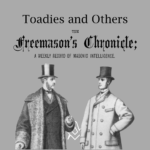 In the realm of Masonry, the principles of equality and respect are paramount. Yet, the presence of toadies—those who obsequiously seek favour from the influential—threatens these ideals. While Masonry embraces diverse beliefs and backgrounds, it rejects the sycophantic behaviours of toadies, flunkeys, and tuft-hunters, urging members to uphold genuine respect and self-worth. The Freemason's Chronicle - 22nd January 1876 |
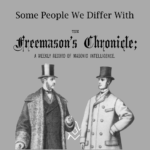 Unveiling the Unpleasant: Some People We Differ With Discover the intriguing dynamics of quarrels within the Masonic brotherhood. From the cantankerous to the litigious, the peevish to the vengeful, delve into the characters that challenge fraternal harmony. Explore their motives, temperaments, and the art of navigating disputes with these fascinating brethren. Brace yourself for a riveting journey into the world of conflicting personalities. |
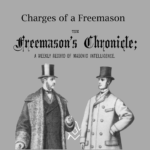 Unravelling the Masonic Mystique: A Deep Dive into the Freemasons' Charges - Explore the intricate world of Freemasonry, its principles, rituals, and the mechanisms for resolving internal disputes. Discover how this ancient fraternity fosters unity, promotes moral conduct, and upholds the sanctity of its secrets, while navigating the complexities of modern society. - The Freemason's Chronicle - 4 December 1875 |
 Unlock the hidden lessons of Masonic Studies! Don't settle for superficial knowledge or mere rituals. Discover the true depth and meaning behind Freemasonry. Expand your understanding of Tracing-Boards, Lectures, and more. Join regular Lodges of Instruction to enhance your Masonic journey. Become a knowledgeable Freemason, not just a token-bearer. Unleash the power of true Masonic wisdom today! |
 Uncover the incredible story of how Masonry saved the life of a Crimean War foot soldier in this historical and masonic account. Through the first hand experience of a soldier engaged in fierce hand-to-hand combat, witness the fateful encounter with a Russian Freemason that changed the course of his life. Learn how brotherhood and a deep dedication to the craft can lead to unforeseen and life-saving circumstances on the battlefield. |
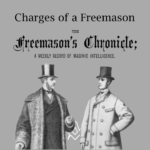 The Freemason's Chronicle - Charges of a Freemason The secrets of Masonry are the exclusive property of the Craft, and can never be communicated to one who is a mere labourer and not an accepted Mason. Hence, no labourer, that is, one who has not been regularly initiated in a legal Lodge. Article first published in The Freemason's Chronicle, 27 November 1875 |
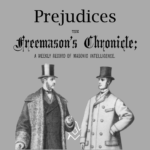 The Freemason's Chronicle - Prejudices Prejudices are partial judgments in favour of, or against certain persons or things, and, for convenience sake, may be ranged in two categories—those which are, comparatively speaking, harmless, and those which are harmful. Article first published in The Freemason's Chronicle, Oct. 2 1875. |
 The Freemason's Chronicle - Cliques Is Freemasonry - a Clique ? Man has been defined as a gregarious animal, but in his highly civilised condition he is gregarious only to a limited extent. First published in The Freemason's Chronicle, Oct. 2 1875, addresses the same challenges then as now. |
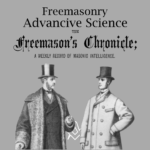 The Freemason's Chronicle - Freemasonry - an Advancive Science Is Freemasonry - an Advancive Science ? Not to confuse advancement with innovation. Has it been the case that Freemasonry's survival for 300 years plus is due to being an Advancive Science, tending to advance. First published in The Freemason's Chronicle 18 September 1875, addresses the same challenges then as now. |
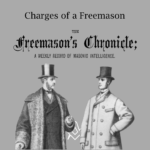 The Freemason's Chronicle - Charges Of A Freemason An interpretation of the "Charges of a Freemason", written Bro. Cornelius Moore and published in 1875, that introduce certain opinions that for some readers, will not sit well in contemporary times. - The Freemason's Chronicle, Sept. 11, 1875 |
 On The Order Of The Temple And Its Doctrine. THE Order of the Temple is divided into two great classes, denominated respectively the Order of the Temple and the Eastern Order. The Eastern Order gave birth to the Order of the Temple, and in the course of time has become an appendage of the latter. It is in ancient Egypt that we find the cradle of the Eastern Order. The Freemason's Chronicle, Sept. 4, 1875 |
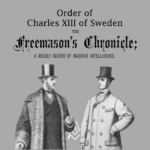 Order of Charles XIII of Sweden The following translation of the Manifesto of King JL Charles XIII of Sweden, on the occasion of his establishing the Masonic Order which bears his name, and of the Statutes of the said Order, may be interesting to our readers. The Freemason's Chronicle, Aug. 28, 1875 |
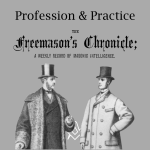 Most of our readers in the course of their experience, have doubtless met with enthusiastic brethren who take it for granted that a Mason can do no wrong. These enthusiasts are thoroughly convinced that the vast majority of those who join the Order are the most benevolent, the most moral, and the very noblest members of society. - The Freemason's Chronicle 10 July 1875 |
 An article investigating the relationship between masonry and citizenship. Are the principles of Freemasonry aligned with the freemason's claim to be a better citizen of the world? The Freemason's Chronicle - 19 June 1875 |
 A visitor must make clear his identity to the satisfaction of the Lodge he proposes to visit. More than once have we been asked to explain our views as to the reception of strangers in a Lodge. - The Freemason's Chronicle - 29 May 1875 |
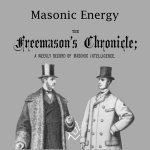 Is there reason in the accusation that Masonic energy looks only to a course of good feeds, when we can point to such grand results as have been achieved in these latter years, both in respect of the extension of our Order ? - 1May 1875 |
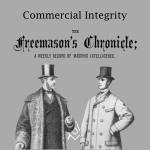 Implementing Freemasonry's peculiar system of morality in our day to day business affairs was the topic of this article, Commercial Integrity, first published in The Freemason's Chronicle - 8 May 1875 |
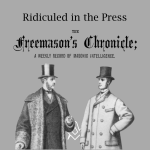 Ridicule has been somewhat illogically described as the test of truth. If it were so, Freemasonry ought to have perished long since. Two press reports from May 1875 covering the |
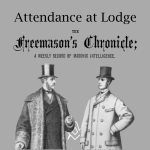 There are many things which Freemasonry will do for a man in the way of opening his mind and giving him larger and kindlier views of life, but Freemasonry itself, cannot eradicate the natural bias of the disposition. |
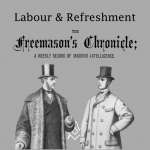 There is, we fear, too marked a tendency in very many Lodges to hasten through its labours, with a view to entering, as soon as possible, upon the business of refreshment. - The Freemason's Chronicle 17th April, 1875 |
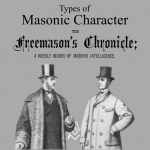 Another example that demonstrates that nothing really changes in Freemasonry. In an article the Types of Masonic Character published 145 years ago in The Freemason's Chronicle 10th April, 1875 |
 A brief history on the relationship between the British Monarchy and the craft - The Freemason's Chronicle 20th March , 1875 |
 What are the qualities of a convivial man and how does this dovetail perfectly in to Freemasonry ? 16th March, 1875 |
 A review of the "Sketch for the History of the Dionysian Artificers," a fragment, by Hyppoli to Joseph Da Costa - This little work may be regarded as, so to speak, the Holy Grail of Masonry. |
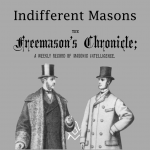 Nothing really changes, an article Indifferent Masons, From Le Monde Maçonnique 1874. Translation published in The Freemason's Chronicle 20th February, 1875 |
 In handling an intruder in the lodge, we endeavoured to show that a good Mason should be a gentleman, and a sincere man. The Freemason's Chronicle 20th February, 1875 |
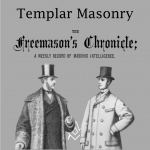 Templar Masonry - a historical aspect of the Religious and Military Order of the Temple published in The Freemason's Chronicle 13th February, 1875 |
 Secrecy perhaps the strongest objection urged by the enemies of the Masonic Order against its existence published in The Freemason's Chronicle 20th March 1875 |
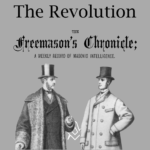 Freemasonry In The United States during And After The Revolution We take a look at Freemasonry in the United States during and after the Revolution first published in The Freemason's Chronicle - February 6, 1875 |
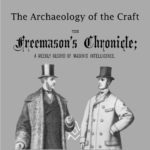 We take a look at the archaeological connection with the Craft, first published in The Freemason's Chronicle - January 30, 1875 |
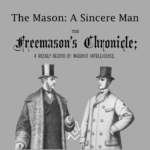 What it means to a Freemason to be a sincere man. Extract: first published in The Freemason's Chronicle - January 23, 1875 |
 What it means to a Freemason to be a citizen of the world ? First published in The Freemason's Chronicle - January 16, 1875 |
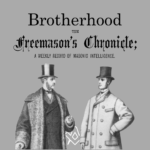 Brotherhood! In that one word what sympathetic associations arise. First published in The Freemason's Chronicle - January 9, 1875 |
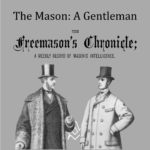 This opening article was written 145 years ago, yet it resonates with Freemasons today as it did then. First published in The Freemason's Chronicle, January 2, 1875, Issue 1 |
masonic knowledge
to be a better citizen of the world
share the square with two brothers

click image to open email app on mobile device



